Twice Denis Law went looking for candidates to fill political positions in Renton, and both times he was persuaded by others to run himself. The first time was for city council, where he served one term; the second was for mayor, where he won three terms, the last two unopposed. Law probably could be a Daley-esque mayor-for-life, but he is building a new house in a decidedly nonurban part of Skagit Valley and will not seek re-election.
Renton will miss him.
If an entire city can be woke, then Renton might be the wokest. Law hasn’t just been the face (of color) of this city for 12 years, his administration has remade Renton’s public sector to be more accessible and answerable to a changed citizenry. It won a national award in 2014 for diversity from the National League of Cities and the National Black Caucus of Local Elected Officials, and is an in-demand adviser on inclusion to individual cities across the country and organizations such as the Association of Washington Cities and U.S. Conference of Mayors.
“He has changed things so much,” said the Rev. Dr. Linda Smith, who leads the Renton African American Pastoral Group, “that if there were a humanitarian award for mayors, Denis Law would get it.”
As the fog of marginalization is lifting in Renton, once unimaginable opportunities are coming into view for its residents of color, more of whom are running for citywide offices in 2019. Smith and Kim-Khanh Van, who is Vietnamese American, are mounting campaigns for city council seats. Both are members of the Mayor’s Inclusion Task Force. James Alberson, who is Black, also is running for the council. Ruth Pérez, a current council member who was born in Mexico City, is running to succeed Law as mayor.
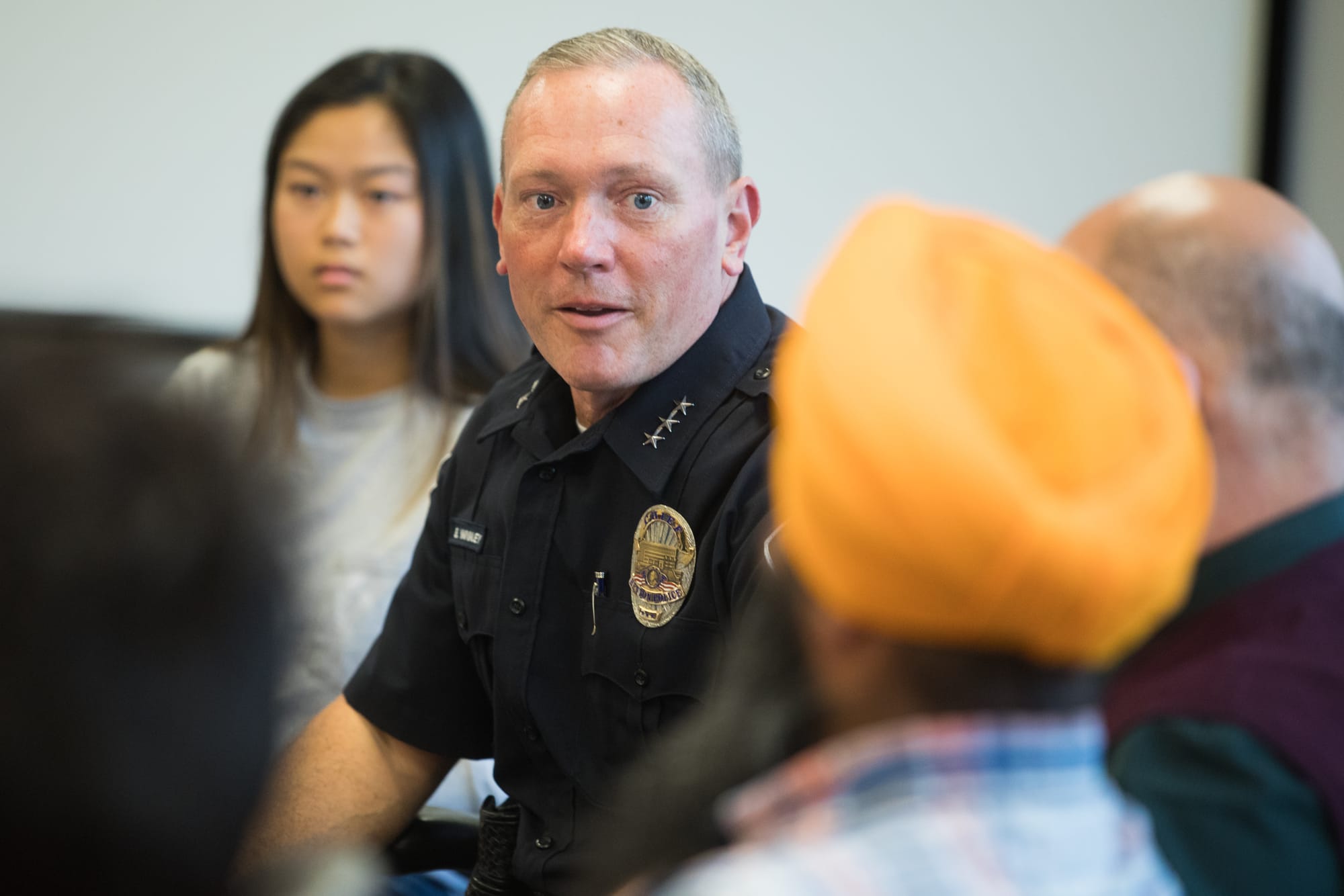
At his heart, Law is an old newspaper man and photographer. Forty years ago, he was the general manager of a chain of south Seattle neighborhood weeklies, for which he also was an award-winning spot-news photographer. He was renowned for beating first responders to emergency scenes, where he had earned trust and was allowed free rein. Even today, Ed VanValey, his chief of police, will head upstairs at Renton City Hall to deliver an incident briefing, only to find Law, portable police radio in hand, saying, “I heard.”
Law founded the weekly Renton Reporter, then the Auburn Reporter and Kent Reporter, as well as a glossy monthly, Renton Magazine, by the time he won his first term as mayor. The magazine ran inviting photos and upbeat stories about Renton, reflecting Law’s attachment to a place where he had lived in the 1980s, when he says the goal was to get out. He did leave, but returned in 1999 with his wife, Patty.
“The sense of community here is stronger than any community that I’ve ever been in,” Law said of his city, “and I’ve lived in and published throughout the King County area.”
That community also is dramatically different than the sleepy, Boeing-dominated company town where Law first lived. By the time he took office in 2008, Renton was like a teen in the midst of a spasmodic growth spurt. Its population doubled between 2000 and 2016, to solidly north of 100,000, the eighth-largest city in the state.
Underlying Renton’s population gains was a region-leading surge in nonwhite residents, up 223 percent between 2000 and 2016. Renton’s transition to a majority nonwhite city shot from likelihood to inevitability in a blink of an eye. Now slightly below 46 percent white, Renton is the 20th most culturally diverse city in the country when also taking into account linguistic and birthplace diversity. It sits in a swath of majority nonwhite cities in south to east King County that also includes Bellevue, Kent and Federal Way.
Renton’s emerging diversity not only foreshadows the shifting demographics of this country, it largely defines Law’s administration. He’s more than embraced the change. Law is half-Chinese but doesn’t like to discuss his racial background. Doing so might assign a self-serving motivation to seeking inclusion, sort of like imposing frivolous requirements for membership in a club that everyone should be allowed to join. Law is a successful businessman and has a businessman’s sense of practicality. He had campaigned for the job to improve services and efficiencies in a community he loved, and, as he saw it, the rapidly changing demographic of his population was what he had to work with, so he tapped into it as a necessary ingredient and an asset.
“We're not all the same, but government is for everybody,” Law said. “And we should try to create an environment where people feel safe and engaged and welcomed. The question was: How do we do this effectively, and not just to say we’re doing it so therefore we’re good people?”
Nothing was going to be easy for Law anyway. The year before he took office, the state Legislature passed a 1% annual lid on property tax levies by municipalities at a time when operating costs were rising 3% to 5% per year. In 2008, Renton also annexed a depressed area, Cascade/Benson Hill, which now accounts for almost a quarter of the city’s population and where 12% of its residents live below the poverty line. And, of course, the entire country was seized by a Great Recession.

Back then, the new mayor found his department heads to be sharp, dynamic and committed to change, but the rest of the city bureaucracy was lacking in efficiency, goals and “unified voice of what better looks like.” Law recounted this during an interview in an office that seems to afford him a view of every inch of his city. He was determined to change the culture of the city’s workforce, emphasizing a proactive approach to improving customer service, while building morale and motivation among city employees with positive accountability.
The civic argument for inclusion seemed self-apparent: Growing trust and access in previously ignored communities would broaden the base for input and ideas, helping to change relationships and perceptions, which tap directly into customer satisfaction. Giving priority to equity and inclusion wasn’t simply a way to accommodate changing demographics, it literally was a business model.
One of the pillars in the plan adopted by the council in 2012 was Building an Inclusive City with Opportunities for All.
Already waiting for a crack at that model was Preeti Shridhar, then the city’s communications director and now Law’s deputy public affairs administrator. Before going to work for Renton in 2006, she had worked 15 years with the city of Seattle, for public utilities, then in the Office of Environment and Sustainability. During that time, Shridhar helped create a diversity initiative that preceded Seattle’s Race and Social Justice Initiative.
“In Seattle, we did a fantastic job of translations and we did a fantastic job of recycling those translations,” she said. “But that's not communication. That's not service. That's not inclusion and equity.”
Shridhar, originally from India, took on the task of rewriting Renton’s mission and business plan. Mindful that Seattle’s Race and Social Justice Initiative was a directive in 2004 by then-Mayor Greg Nickels, Shridhar made hers a collaborative effort across all city departments. One of the pillars in the plan adopted by the council in 2012 was, “Building an inclusive city with opportunities for all.” All outcomes would be judged against that mandate, and inclusion would be a competency criterion for leadership positions in Renton.

Meanwhile, translations also were handled. Renton now routinely translates its public materials into Chinese, Russian, Spanish and Vietnamese. The city has a Language Line, which the public can use to request translation into other languages.
We were talking in the mayor’s conference room when Shridhar gestured to a framed proclamation for an “Inclusive City” that hangs outside Law’s office. It is written in Spanish.
When in 2014 Renton hired Benita Horn, an African American equity consultant, it was the equivalent of squirting accelerant on the city’s inclusion efforts. She conducted an inclusion assessment, internally and externally, of city systems and access points. She began annual, mandatory citywide training on implicit bias and related subjects. She helped develop an Equity Lens to identify unintended adverse impacts on vulnerable communities in policies, budgeting and planning.
Horn also examined key policies, such as hiring and contracting, to identify and remove barriers to access. This led to the city instituting in 2018 an application process in which initial departmental reviews do not include any identifying information, such as names and addresses, even resumes and cover letters, so hiring managers could focus on qualifications and experience. The results, as hoped, have been more diverse candidate pools, most visible in the police force, which by far has had the most churn of any Renton department. The city also has enlisted community members to diversify interview panels.
For Renton, many of those measures are playing the long game. Changing attitudes and culture, even the racial mix of the workforce, as well as removing barriers to access — all elements of what typically is defined as systemic racism — requires time and sustained effort. The exposure to civic participation and development of two-way access points is manifested in eye-opening fashion in the Mayor’s Inclusion Task Force, which is composed of members from Renton’s previously ignored and marginalized communities. Failure to build trust and knowledge of the public sector and its processes is where most city governments miss the mark on improving engagement, according to Dr. Anne Taufen, an associate professor in urban studies at the University of Washington Tacoma.
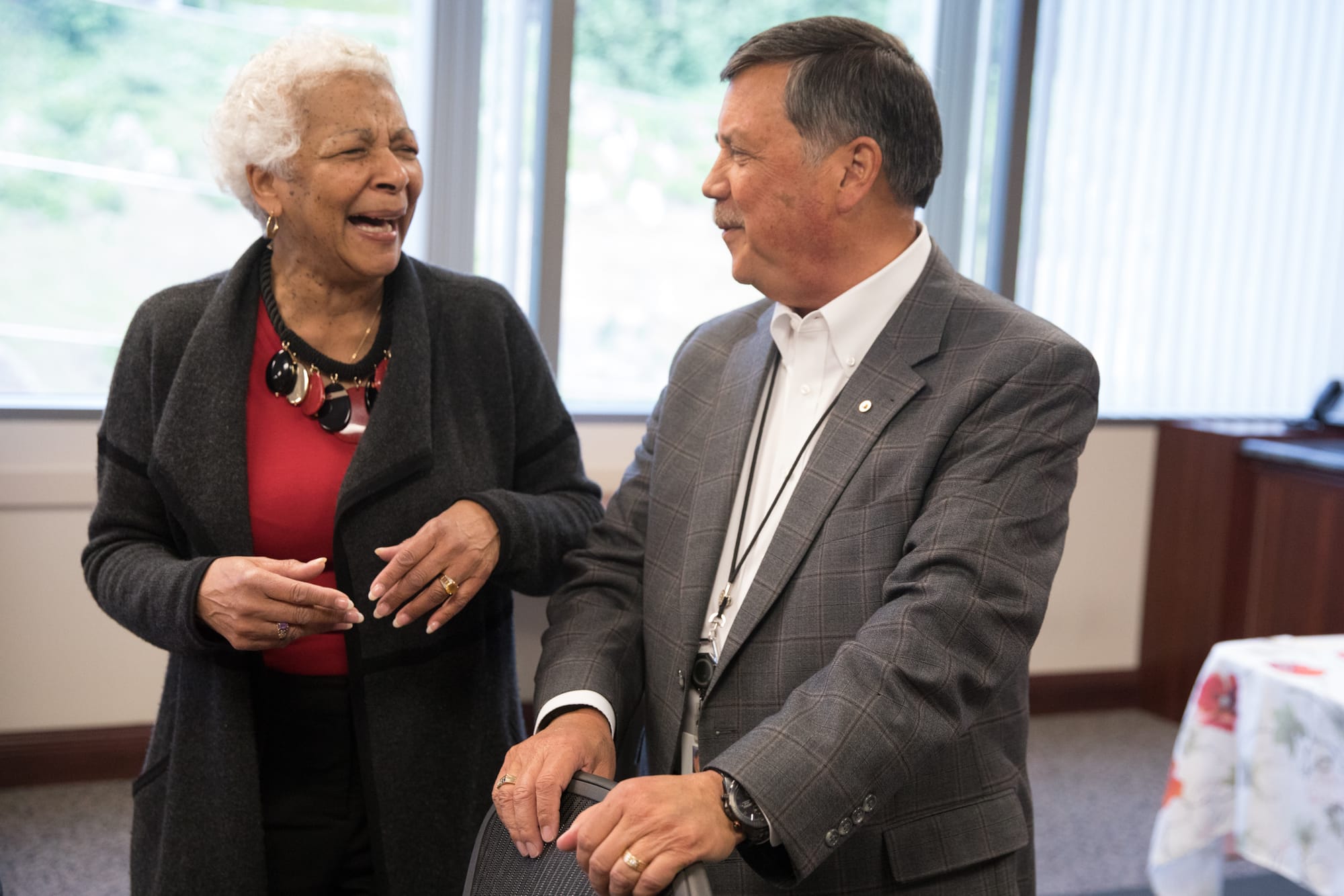
“If people have developed a facility and a comfort level with their government and have networks of people who are in the know, that’s the real fundamental piece around inclusion and engagement,” Taufen said. “And then when you add an equity piece, recognizing that some neighborhoods and some populations deserve some extra investment because historically they’ve borne the brunt of decisions that didn’t take their needs into consideration.”
At the beginning of his administration, Law inherited a diversity committee that he found useless. “It was a bunch of people sitting around, talking about things they didn’t want to get involved with,” he said. Law dissolved that group in favor of developing a network of people who eventually formed his Inclusion Task Force.
One of the original members is Julio Amador, who is from Tijuana, Mexico, a city of immigrants that gave us Caesar salad, as he is quick to add. He ended up in Renton by searching a map of the region for the place with the best logistics for travel. While taking a class at a local firehouse, Amador was challenged by a white woman to produce documentation that he was in the country legally. He showed his U.S. passport card, but was incensed and did not know where to register a complaint. He tried City Hall, where he was introduced to Law’s aide, Shridhar.
It was obvious to Amador that Shridhar actually was trying to get to the bottom of his complaint. “In my book that’s called transparency, and she made me an engaged citizen,” he said. Ever since, he’s been one of the city’s most prolific volunteers; he most recently helped collect input from the Latinx community for Renton’s parks, recreation and natural areas plan.
I feel like part of the community. It’s like a family.
Shridhar and Horn constantly are scouting for and recruiting new task force members, who have to apply and be appointed by the mayor. Prospective members have to agree not simply to represent their communities, but also to proactively seek input and participation and act as a conduit of essential information. It was through the group, for example, that Renton officials learned that Muslim girls were not using city pools because of their need to remain covered; all pools now have female-only hours.
A resident for 32 years, Violet Aesquival, of Filipino American Community of Renton (FACOR), said the city was just a place she lived until she joined the original version of the task force. Nine years later, “I feel like part of the community,” she said. “It’s like a family.”
It’s a more prosperous family, too. To meet the rising demands of a growing, more aware and participatory population, Law could not rely on just creating efficiencies in the public service sector. His administration had to grow revenue as well.

Renton was the scourge of developers because of slow and often overreaching bureaucracy when Law took office, but he streamlined its permitting processes to become more user friendly. With a blue-collar economy not completely dependent on tech, Renton is anchored by giants Boeing and Paccar, and recent expansions of Valley Medical, Kaiser Permanente, and Ikea. The Landing shopping center, completed in 2010, is the city’s second-largest taxpayer. The city’s unemployment rate of 3.7%, as of November 2018, is better than the state’s 4.3%, which is the lowest since the mid-’70s. On the horizon, Southport on Lake Washington, a 17-acre complex anchored by a Hyatt Regency, is projected to serve some 9,000 workers, hotel guests and apartment dwellers. Last year, the city council unanimously adopted a plan for a repopulated and resurgent downtown already awakened from a long slumber.
Riding this wave of development and civic engagement, Law worked with former Seahawk star Doug Baldwin and partnered with the Renton School District and HealthPoint to build a $15 million Family First Community Center in Benson Hill, the historically underserved community annexed during Law’s first year in office. The Renton City Council jump-started the project with a $4 million commitment, and Baldwin kicked in $1 million via his foundation. Groundbreaking is projected for the first quarter of 2020.
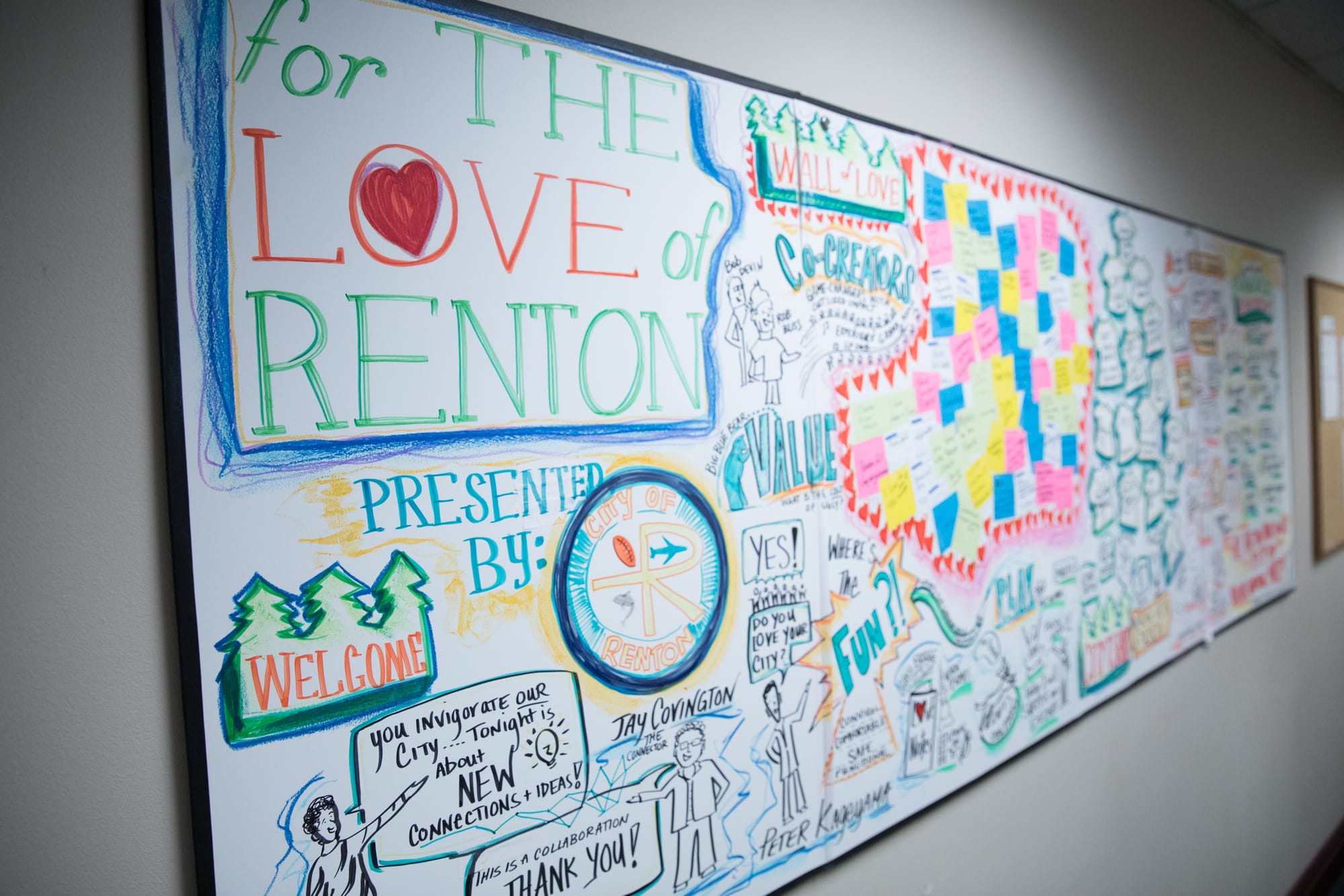
Still, as exciting as it all seems, Law believed all along that any progress would have been rendered meaningless if people did not feel safe in their own city. It was a baseline necessity that he understood intimately through his years of newspapering, his own community involvement and his long relationship with first responders. Plus, mayors may have the most opportunity to shape cities through police departments, which are the most interactive faces of local government and have the most fraught relationships with communities of color.
Public safety was destined to be a priority under this mayor. After all, officers on his police force like to joke that they serve “D. Law.”
As he monitored police service calls early in his first term, Law learned of crime-infested hot spots near the downtown core of his city. Out of concern he began communicating with a single mother living at a property under siege. One day she emailed Law about shots fired the previous night, forcing her to take her young son downstairs to avoid the bullets.
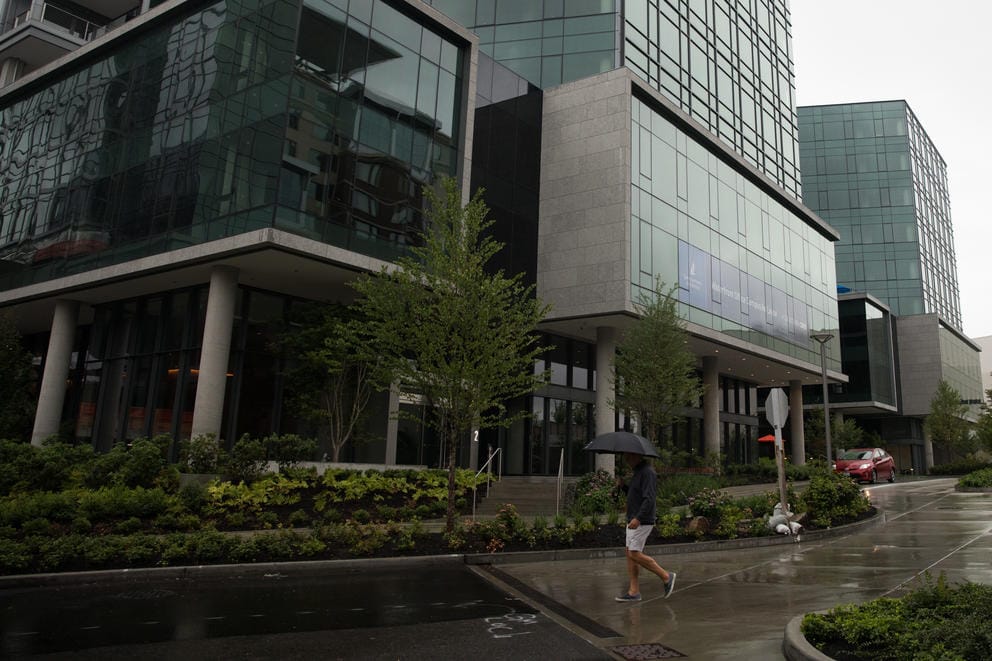
Renton's new Southport development on Lake Washington. Beginning in 2020, Southport will host a ferry service that will transport riders from the southernmost end of Lake Washington to Seattle's South Lake Union neighborhood.
“It just pissed me off,” Law said.
Law summoned his police chief — VanValey’s predecessor, Kevin Milosevich — and the longtime city attorney. He challenged them to come up with an idea better than the one he had conjured, which was to station a squad car in front of the property with lights and sirens blaring, all day, every day. The three cooked up an approach known generally as “nuisance abatement.” This could be called a kind of civic harassment aimed at bad elements, using a combination of police presence, inspections and ordinance enforcement, and informing landlords, creditors and lien holders of the pattern of violations.
The tactics ended the service calls to the single mother’s home. Today that neighborhood has a new STEM-focused school, Sartori Elementary, which earned the city a Governor’s Smart Communities Award. Under similar scrutiny, one restaurant cleaned up its crime-riddled act and another closed down after, in addition to the usual harassment, the city raised objections to liquor license renewals. A huge message was served to the rest of the community.
These days, there is a lot more emphasis on preventive policing in Renton. Though the complexion of the force — nearly 82% white — doesn’t yet reflect the community it serves, it has made more progress on that front than the rest of city government. One of VanValey’s deputy chiefs, Kevin Keyes, is Black. The department also has attached itself to all of Renton’s citizen access groups, including the Mayor’s Inclusion Task Force, as well as the Renton African American Pastoral Group, Latino Forum and Vietnamese-Chinese Forum. It conducts regular access events, including a monthly “Coffee with a Cop,” and its officers put a lot of time connecting with client communities. Asked to provide examples of his Latinx outreach activities, officer John Awai, who is Hawaiian but fluent in Spanish, delivered a 14-bullet-point report as “a small snippet of what I do.”
The connections pay dividends.
Because of my relationship with Mayor Law, I knew he would acknowledge and do something about it or let me know what I could do so we don’t have these issues in the future.
A Renton police officer recently provided off-duty presence at the local Sikh temple, Gurudwara Singh Sabha of Washington, during a contentious congregational election. The off-duty cop tried to intervene in an altercation, but was badly outnumbered and had to radio for reinforcements. The same officer was back the next week, at the temple’s request, for the announcement of election results.
Believing he was being proactively agreeable, the officer manned the entrance, opening the door and greeting the congregants. One of them asked the officer to remove his shoes and cover his head, in accordance with Sikh custom at places of worship. Wary of a reprise of the previous week’s conflict, the officer said he couldn’t do that, insulting his hosts.
The resulting furor prompted Satwinder Kaur to write an email the next day. A Kent city council member, Kaur once belonged to the Mayor’s Inclusion Task Force in Renton. She knew where to send the email.
“Because of my relationship with Mayor Law, I knew he would acknowledge and do something about it,” she said, when reached by phone, “or let me know what I could do so we don’t have these issues in the future.”
Law immediately put his police chief on the case. Ed VanValey is Renton born and raised. He first dreamed of serving on his city’s police force while attending Renton’s Lindbergh High School. VanValey, who is white, took a detour into the military to pay for his college education, was deployed to Iraq, and returned to work in information operations (sometimes known as propaganda, or “fog of war,” in battle conditions), which greatly informed his philosophy of creating and using themes and messages to inform, educate and influence.
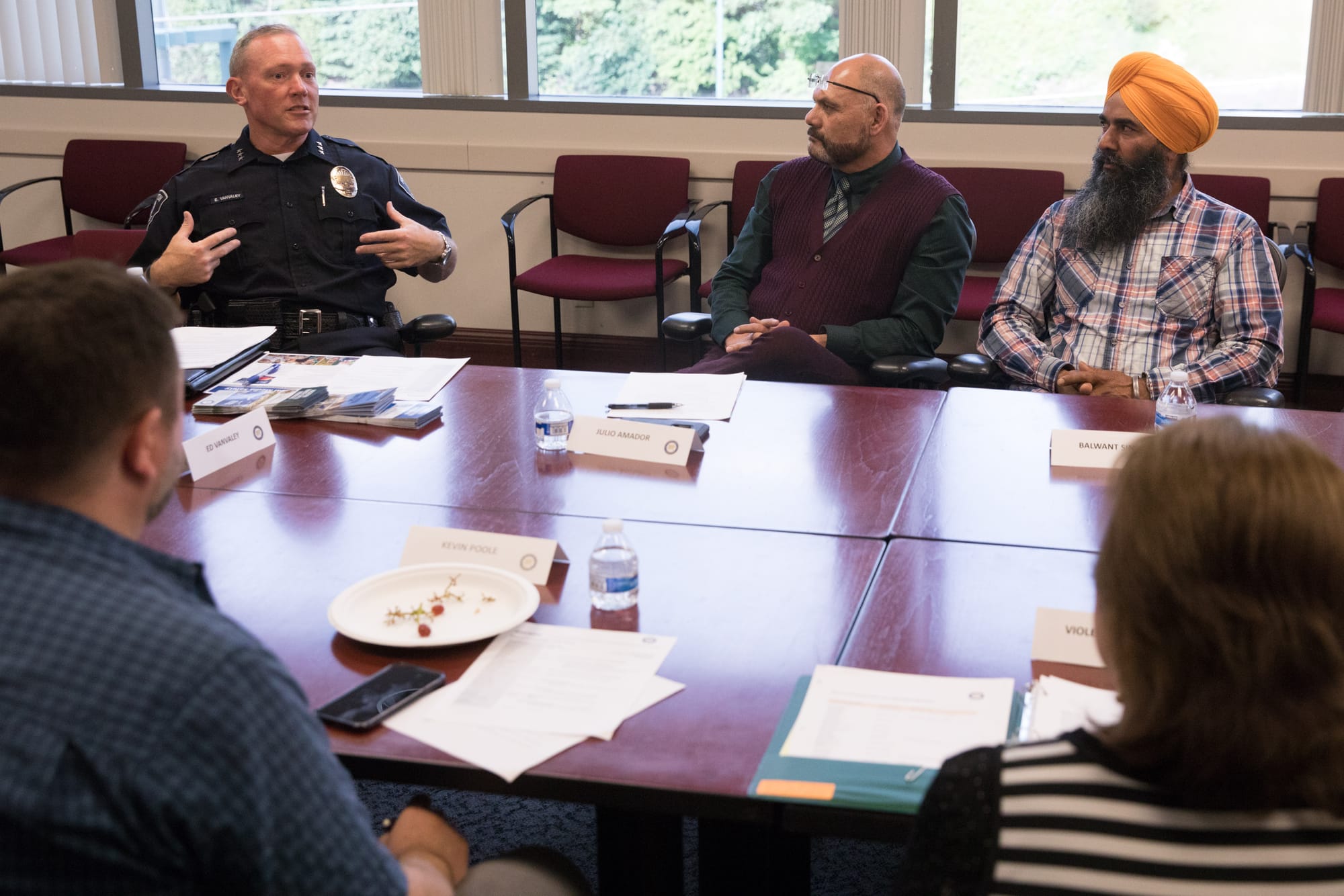
VanValey met with Kaur and three male representatives from the temple, including Balwant Singh, a current task force member. To avoid future misunderstandings, the chief provided the temple with a 24-hour access phone number. They agreed that officers on the site simply for presence would be prepared to remove their shoes and cover their heads. Officers responding for public safety reasons would maintain a respectable distance. VanValey and his command staff, and any available patrol officers, were invited for a tour of the temple and discussion about Sikh customs.
“The reason we can put Ed there with his shoes off,” Law quipped after a report on the incident at a task force meeting, “is because he’s not allowed to do any actual police work.”
Law’s joke gets at something on which the city and its multiracial, senior, LGBTQ and veteran residents agree, that putting in face time is the work. Everyone ends up feeling respected, empowered and in partnership. And those elements help prevent crime, leaving more time for, as VanValey summed, “eating some great food and learning new things.”
Had it not done this work, Renton might easily have had its own Do the Right Thing moment. In that 1989 Spike Lee film, a series of misunderstandings lead to racial tensions in a New York City neighborhood.
Sometimes when we’re dealing with our white counterparts, they don’t see things the way we see them. The things that sometimes happen strikes us at the core of our humanity. It takes away from who we are.
In the Renton version, a young Black man was home for the summer from UCLA, working the graveyard shift at his uncle’s plant in the city’s southwest industrial area. In the wee hours, he found himself locked inside the outer fence. A security guard noticed but did not recognize the young man and called 911. The first officer arrived having responded to a call about a suspected break-in. He handcuffed the young man, who was compliant but insistent that he worked at the plant and questioned the reason for being detained. He was allowed to call his uncle, who verified his story, and was released.
When the young man told his parents about the incident, they were incensed. They called their pastor and discussed organizing a protest. That pastor called Smith, the leader of the Renton African American Pastoral Group. She called VanValey, who reviewed the incident report and video. He then met with Smith, the young man and his parents, and explained police protocol, which had to be applied without regard to race. Though his officer had done nothing wrong, VanValey also apologized, which caught Smith’s attention.
“It really humanized (the young man) and his family, and even me as a person,” Smith said of the meeting. “Sometimes when we’re dealing with our white counterparts, they don’t see things the way we see them. The things that sometimes happen strikes us at the core of our humanity. It takes away from who we are. The way it turned out was just a really powerful experience.”
Smith raised a son in Renton. She remembers, stopping in front of a crosswalk, when he was younger, and having a white male pedestrian spit on her car. In response to such racial dynamics, she forbade her son from having a driver’s license until after he graduated from high school. The price for her was driving him everywhere, and she gladly paid it.
“I did not want him to be stopped by the police,” Smith explained. “For Black people, our goal is to stay alive.”
Given the way Renton has changed, she was asked if she would make a different decision about her son’s driving today.
“I think I would,” Smith said. She smiled, maybe out relief but likely more out of recognition. “I think I would.”
Smith’s son doesn’t live in the city anymore. Like him, her mayor also will become a former resident. And when he does, Denis Law will be leaving a multiracial Renton firmly ensconced in an inclusive future.
Correction: An earlier version of this story stated that Denis Law served two terms on City Council. He only served one. The story has been corrected.

Sartori Elementary in Renton is a STEM-focused school that recently earned the city a Governor’s Smart Communities Award.



